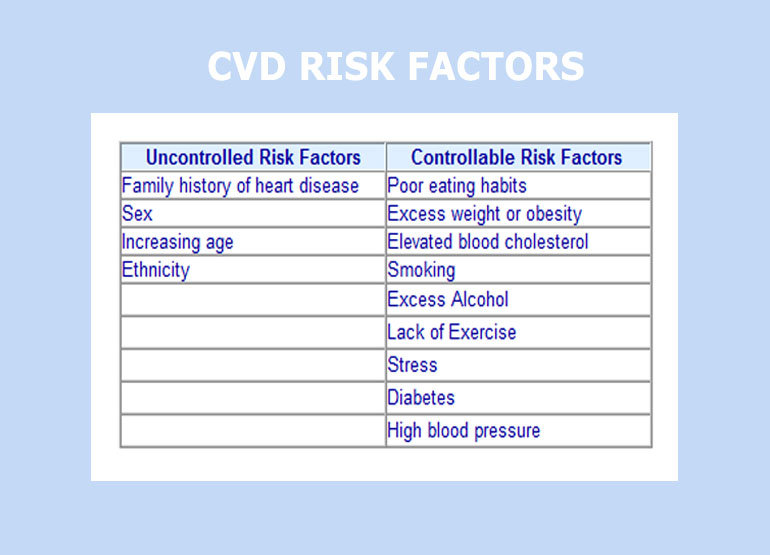Health Pages
CVD Disease Risk Factors
CVD Disease Risk Factors
Risk factors for cardiovascular disease are grouped into two main categories:
1. MAJOR RISK FACTORS
2. CONTRIBUTING RISK FACTORS
Some risk factors, such as diet, exercise, habits, use of tobaco or alcohol are linked to controllable aspects of lifestyle and can therefore be changed. It is up to you to improve your overall health and reduce the possibility of heart attack, stroke or any other forms of diseases of the heart and blood vessels, by reducing or eliminating those factors which can be changed or controlled. Others, such as age, sex, ethnicity and heredity are uncontrolled risk factors and therefore beyond your control.
Researchers have identified some major risk factors for CVD that can be changed: tobaco use, high blood pressure, poor eating habits, excess weight or obesity, stress, diabetes, elevated blood cholesterol, excess use of alcohol and drugs, and lack of exercise.
MAJOR RISK FACTORS:
TOBACO USE - People who smoke a pack of cigarettes a day have twice the risk of heart attack than people who don't smoke. Smoking two or more packs a day triples the risk. Risks to health from tobacco use result not only from direct consumption of tobacco, but also from exposure to second-hand smoke. According to WHO (World Health Organization): "Nearly six million people die from tobacco use and exposure to second hand smoke each year, accounting for 6% of all female and 12% of all male deaths in the world".
HIGH BLOOD PRESSURE - High blood pressure or hypertension, is a risk factor for many forms of CVD, including heart attacks and strokes, and is tself considered a form of cardiovascular disease. High blood pressure can also cause kidney failure and damage to nearly every organ in your body.
POOR EATING HABBITS - Poor eating habits include over- or under-eating, not having enough of the healthy foods you need each day, or consuming too many types of food and drink, which are low in fibre or high in fat, salt and/or sugar. Poor eating habbits can also contribute to the risk of developing CVD, numerous illnesses, and many other health problems.
EXCESS WEIGHT OR OBESITY - As your weight increases, your risk of cardiovascular disease increases. Excess body fat is strongly associated with hypertension, heart disease, high cholesterol levels, insulin resistance, type-2 diabetes, joint problems (such as gout, arthritis and joint pain), cancer, sleep problems, sexual health problems, gall bladder disease, difficulties and complications with pregnancy (and labour), physical inactivity, and increasing age.
STRESS - The role of stress in health and disease is complex, and much remains to be learned, but evidence suggests that stress (interacting with a person's personality, genetic predisposition, social environment, and health-related behaviours) can increase vulnerability to numerous ailments. It is also clear that people who have unresolved chronic stress in their lives or who handle stressors poorly are at risk for a wide range of health problems from minor (like stomachache, stiff neck or cold) to more severe like cardiovascular disease or impaired immune function.
DIABETES - Diabetes is disorder characterized by elevated blood glucose levels due to insufficient supply or action of insulin. Having diabetes doubles the risk of CVD for men and triples the risk for women. Diabetics have higher rates of other CVD risk factors, including hypertension, obesity, and undealthy blood lipid lewvels (typically high triglyceride levels and low HDL levels). They also often have platelet and blood coagulation abnormalities that increase the risk of heart attacks and strokes.
ELEVATED BLOOD CHOLESTEROL - Adequate cholesterol is essential for the proper functioning of your body. However, excess cholesterol can clog your arteries and increase the risk of cardiovascular disease. LDL is known as bad cholesterol because if there is more than the body can use, the excess is deposited in the blood vesels. HDL or good cholesterol, shuttle unused cholesterol back to the liver for recycling, and by removing it from blood vessels helps protect against atherosclerosis.
EXCESS USE OF ALCOHOL AND DRUGS - High levels of alcohol consumption and heavy episodic (binge) drinking are associated with increased risk of cardiovascular disease. Drinking too much alcohol raises blood pressure and can increase the risk of stroke and heart failure. Harmful use of alcohol damages the heart muscle and promotes cardiac arrhythmia. Stimulant drugs (particularly cocaine) can also cause serious cardiac problems, including heart attack, stroke, and sudden cardiac death. The risk increases if drugs are combined with use of alcohol, tobacco or another drug. Injection drug use can also cause infection of the heart and stroke.
LACK OF EXERCISE - To be truly healthy, human beings must be active. A number of studies have shown that people who exercise regularly are less likely to develop cardiovascular disease and many other diseases. Physical activity reduces the risk of premature mortality, improves psychological health, and is important for the health of muscle, bones and joints.
Did You Know?
"CVDs are the number 1 cause of death globally: more people die annually from CVDs than from any other cause. Over three quarters of CVD deaths take place in low- and middle-income countries."
~Source: World Health Organization



